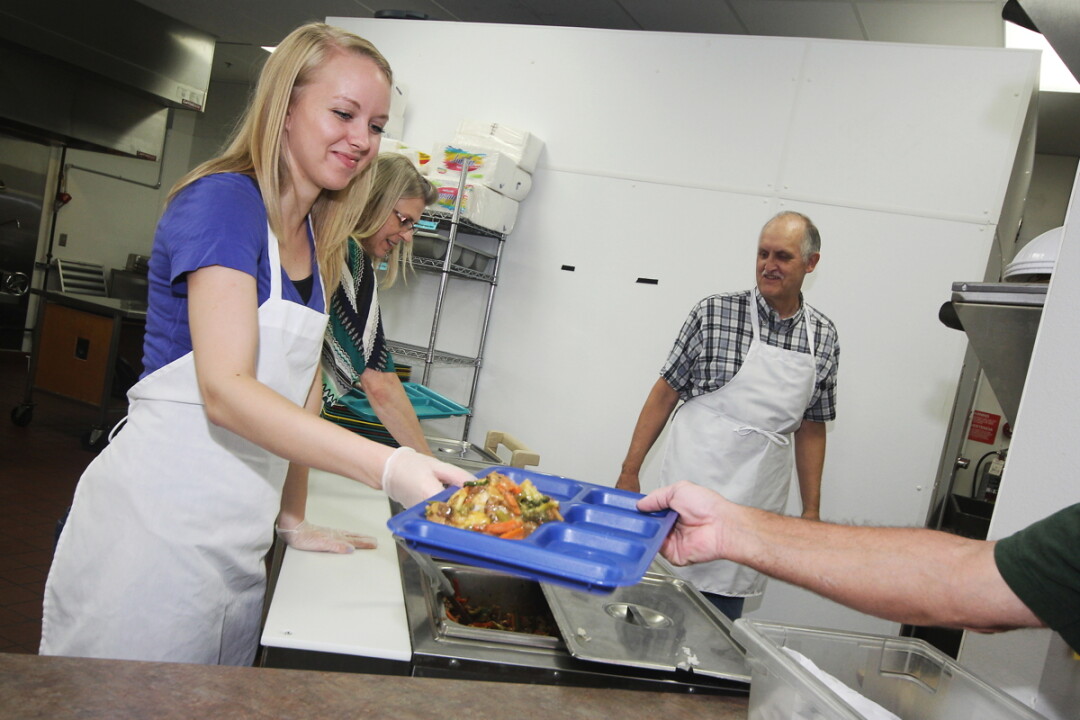Skipping Meals: Dwindling donations mean Community Table may have to cut back on services
Tom Giffey, photos by Andrea Paulseth |

For the more than 40,000 people who visit it annually, Eau Claire’s Community Table offers a simple but vital service: a hot, healthy meal available every day of the year. There are no income eligibility requirements, no forms to fill out, no hoops to jump through – just a free meal to anyone in need of sustenance and social contact.
“Unless we see an increase in end-of-year giving, we’re in jeopardy of cutting services.” – Ben Franko, board of directors president, The Community Table
However, an ongoing financial shortfall may force the Community Table to cut back on its services. The nonprofit has faced an annual shortfall of $10,000 to $15,000 for several years because of dwindling donations. The group has been able to fill the gap by tapping into its savings, but as the end of 2017 approaches, the issue is finally coming to a head, several board members say.
“Unless we see an increase in end-of-year giving, we’re in jeopardy of cutting services,” explained Ben Franko, president of the charitable group’s board of directors. “If all donations ceased today, we’d be out of business by the end of the year.” Fortunately, money continues to trickle in – just not enough.
“The Community Table needs to increase revenues through donations to operate consistently in 2018,” added Pete Riley, a board member and past president of the organization.
The group’s challenge is twofold: The need for services has increased at the same time that donations have declined.
A variety of factors have increased demand for meals at the Community Table, 320 Putnam St., board members say. Riley pegs the increase to the financial burdens experienced by many in today’s economy, coupled by the social and emotional needs of people who have nowhere else to go to share a meal with other human beings.
While the economy has rebounded for many Americans over the past few years, not everyone has benefited. Food insecurity remains a critical problem in the community – one in eight Eau Claire County residents doesn’t have reliable access to adequate food – with many people struggling to met their basic expenses.
As a no-questions-asked service, the Community Table’s guests are diverse, ranging from children to senior citizens. A survey of patrons during the fourth quarter of last year found that two-thirds were men and nearly half were disabled. Seven out of 10 reported that eating at the Community Table “reduces their anxiety over food insecurity,” and 88 percent said they had extremely low or no income. Many guests are senior citizens, who come for social as well as economic reasons, while Franko adds that a growing number of the guests could be classified as “young professionals,” who – although they have steady jobs – are struggling with the high cost of living.
Even as demand has ticked upward, donations have fallen backward. An end-of-the-year letter to donors, which has typically boosted the organization’s coffers, has raised less than expected in the past few years. Likewise, attendance and donations were lower than anticipated at the group’s annual fundraiser, Picnic on the Green, in July. Riley worries that the organization will “get to the point where we won’t be able to provide this service if we don’t turn around the donations.” In that eventuality, the Community Table would have to consider only serving meals on certain days.
Keeping the facility staffed and operating every day on a tight annual budget of about $300,000 is a challenge, Franko acknowledged. Those who visit the Community Table and see the operation humming along with the help of volunteers and donated food likely don’t think of the other costs the organization incurs, such as rent, utilities, and staff salaries (even though, when fully staffed, it only has the equivalent of three full-time employees). The monthly cost of operation exceeds $10,000, Riley said. Some of the Community Table’s budget comes from grants (including federal Community Development Block Grants), from agencies such as the United Way, from in-kind donations of food, and from private donors. It is the latter category – community donations – that has suffered in recent years, board members said.
Longtime executive director Rachel Keniston retired from the Community Table at the end of 2015. She was replaced by Lynn Standorf, who left the job earlier this year after about 18 months. The organization is currently seeking an executive director, ideally someone with a strong talent for fundraising. While such skills will aid the organization in the long term, they won’t help in the short term. “The new person isn’t going to magically come with a correct balance sheet,” Franko noted.
What can correct the balance sheet is the public’s generosity: Community members can help the Community Table by making donations (online, in the mail, or in person), by volunteering, and by attending fundraising events. Small, direct actions like this can eventually add up, just as the small, direct actions of providing warm, nutritious meals to those in need can combine to improve the lives of thousands.
Donations to the Community Table can be made by clicking here or by sending a check to the Community Table, 320 Putnam St., Eau Claire, WI 54701.
FEEDING THE NEED
The Community Table is facing a financial crunch that could impact its services. Here’s a look at who the people this Eau Claire-based charity serves, according to a survey conducted in late 2016.
40,000+
Meals served annually at the Community Table, which offers a free hot meal daily to anyone who wants it.
70%
Share of guests surveyed who say eating at the Community Table reduces their anxiety over food insecurity.
88%
Share of guests surveyed who report having extremely low or no income.
48%
Share of guests surveyed who report they are disabled.


















